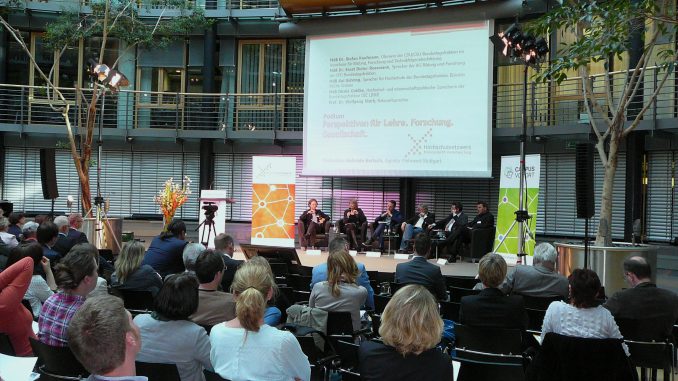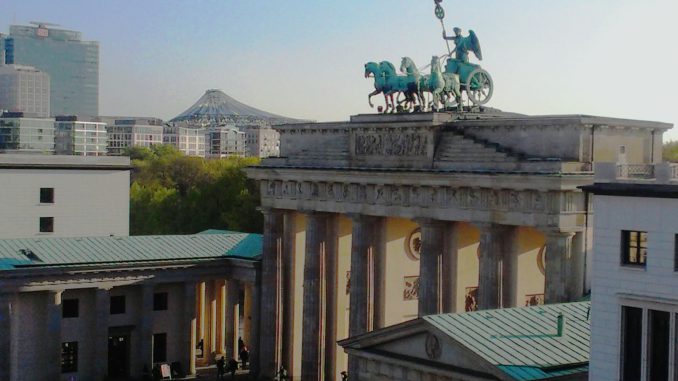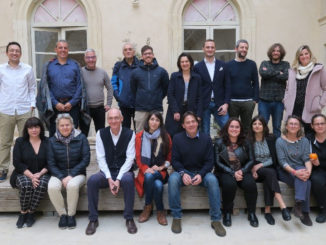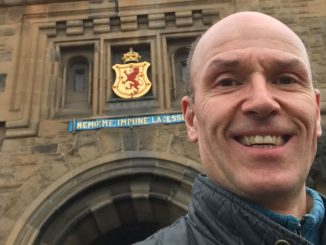
Teaching, research and society – these three arenas are closely interconnected, but often perceived as separated. Therefore, the association currently being set up and called University Network Education through Responsibility (Hochschulnetzwerk Bildung durch Verantwortung) has made it its goal to remind academic institutions of their original task: To make an active contribution to solving society’s challenges. It is the intent of this newly founded organization to encourage civic engagement of students, teaching staff and other members of academia. This will result in an opening of academic (research and teaching) institutions towards society, which in turn will become involved in research and teaching.
Since 2009, more than 30 universities have joined the “University Network Education through Responsibility” to support and promote education approaches dedicated to serving the common civic interest (e.g. Service Learning, Community Based Research, Campus Community Partnerships and Social Entrepreneurship Education). Since March 2015, the club has now been in the process of official foundation. This milestone was celebrated on April 23, 2015 at the Allianz-Forum at the Brandenburger Tor in Berlin with welcoming addresses and speeches by representatives of the Federal Ministry for Families, Senior Citizens, Women and Youths (BMFSFJ), the Stifterverband für die Deutsche Wissenschaft (Donors’ Association for the Promotion of German Sciences and Humanities), the President of the Deutscher Paritätischer Wohlfahrtsverband – Gesamtverband e. V (General Parity Association), the Vice President of TU Berlin (Technical University Berlin) and the President of the Wuppertal Institut für Klima, Umwelt, Energie (Wuppertal Institute).
MBS, one of the organization’s founding members, was represented by its dean, Prof. Dr. Stefan Baldi, and myself. As a member of the extended board of the association, I want to share with you the day’s most important outcomes.
Necessary Transformation
Prof. Dr. Uwe Schneidewind, President of the Wuppertal Institute and keynote speaker, presented the programmatic orientation of the university network with a speech on “Transformative Science. New Perspectives for Universities with Social Responsibility”. In his presentation, he compellingly validated that the present tasks of universities – research (first mission), teaching (second mission) and social responsibility (third mission) – should be brought into a new order so that social responsibility, third mission so far, would range first.
Even if the approach is not actually a revolution, it is the cornerstone of transformative science. Because all teaching and research have any meaning only if they serve society – and if they are conceived and realized in context with it. For universities, this implies that they should not only encourage students to volunteer for social projects or honorary work. It has also become necessary to redefine research and teaching as well as all other activities of universities in the context of social responsibility. In short: A new mission statement for research and teaching is required, one that is obliged to assuming social responsibility and is committed to the concepts of sustainability and participation.
The event closed with a panel discussion with representatives from the various political parties of the Bundestag, the German Federal Government, amongst them Nicole Gohlke (Die Linke), Dr. Ernst Dieter Rossmann (SPD), Stefan Kaufmann (CDU/CSU) und Kai Gehring (Bündnis 90/ Die Grünen). They encouraged the university representatives to continue their efforts within the network, emphasizing that they should also raise public awareness for their organization’s issues. For the members of the network, this means that they must – on a national level – make the implications and scope of the universities’ responsibility for society’s problems visible in the public sphere. Mastering this challenge together will bring new chances for supporting and gaining future partners.
Scientific support for the initiatives of the network and universities is crucial, of course: We all agree that assuming social responsibilities has many positive effects. But all approaches must be solidly grounded in scientific research to place the entire project on a firm scientific and validated foothold.
First Mission at MBS
After the congress, we at MBS are encouraged even more to continue our engagement to society and to make the related issues an integral part of our research and teaching. At the same time, we will undertake all required efforts to find and enter alliances that serve a common interest, not only to enhance the “University Network Education through Responsibility” but also our own and that of our students. We are, for example, already discussing a partnership with the Social Entrepreneurship Akademie. And we are eager to see where the paths of transformative science will lead us.





